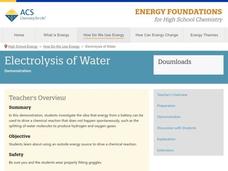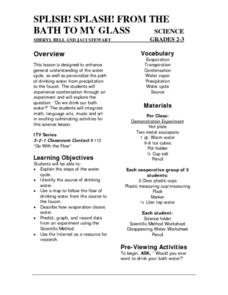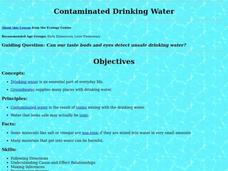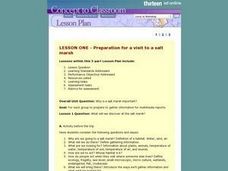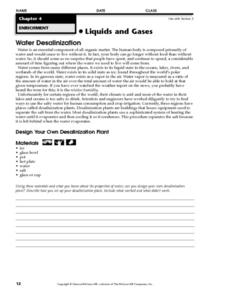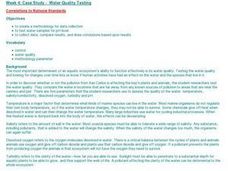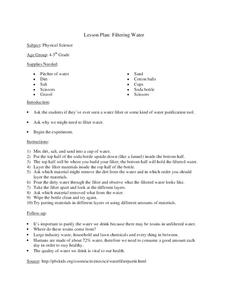Pingry School
Synthesis of an Insoluble Ionic Salt: A Stoichiometry Experiment
Challenge young scientists to design their own experimental procedures. They write the procedure for properly preparing two grams of a water-insoluble ionic salt. To finish, they perform the experiment and collect data to prove their...
American Chemical Society
Electrolysis of Water
Young scientists know that water is H2O, but can they prove it? Through a simple electrolysis of water demonstration, scholars see the two gases produced as a result of a chemical reaction. Because this reaction doesn't happen...
Curated OER
Surface Water and Groundwater
Students examine distribution of water and minerals. In this surface and groundwater instructional activity, students conduct an experiment with fresh and salt water making hypothesis and drawing conclusions about minerals.
Curated OER
Water Pollution Prevention and Conservation
Students examine how to conserve water. They also discover how to prevent water pollution. They examine the Earth's water distribution as well.
Curated OER
Properties of Salt
Students see how the properties of salt affect the color of flame, the flow of electricity, and the freezing temperature of water. They identify salt and sugar crystals under a microscope and discuss various practical uses of salt.
American Chemical Society
Changing the Density of a Liquid - Adding Salt
Fourth in a set of several little lessons on density, this one compares the density of fresh and salt water. First by demonstration, and then by a hands-on activity, learners find that adding salt increases the density, as is evidenced...
Curated OER
Healthy Snacks Project Lesson
After learning why it is important to limit salt, fat, and sugar in their diets, divide your class into pairs or groups to complete this project. Each group will create two charts: unhealthy and healthy foods. They will cut out food...
Curated OER
Splish! Splash! From the Bath to my Glass
An excellent instructional activity on the water cycle! In it, learners should gain a general understanding of the water cycle, along with how water first falls as precipitation, then ends up coming out of our faucets. This instructional...
Curated OER
Contaminated Drinking Water
Young scholars explore water and determine whether or not it is safe to drink. In this water exploration lesson, students are split into groups, to acts as the polluter, taster, and recorder. Young scholars explore by placing different...
Curated OER
Contaminated Drinking Water
Students predict, experiment, and draw conclusions about the safety of drinking water. In this ecology lesson, students participate in an experiment to determine if they can taste or see contamination in drinking water. Data is collected...
Curated OER
Salt Marsh in a Pan
Students create a model of a salt marsh to discover the impact of pollution and human activities on water-based habitats including bays and the ocean. They recognize the relationship between natural and developed areas. Students impact...
Curated OER
CHM 152-Acids, Bases and Salts (Chptr. 14)
In this acids, bases and salts worksheet, students answer sixty three questions about ionization, pH, pOH, strong acids and bases, equilibrium and salts. They write formulas for acids and bases, they identify conjugate acids and bases...
Curated OER
Amazing Salt
Students examine the effects of salt on ice. In this salt lesson, students observe what happens to the temperature of ice when salt is added, then make ice cream to see how this knowledge can be used.
Curated OER
Properties of Salt
Students discuss certain properties of salt and how it is used every day as well as harmful uses. They experiment with salt to see it conduct electricity, form crystals and water freezing temperature. They complete a worksheet to record...
Curated OER
Why is a salt marsh important?
Students discuss the salt marsh. They define the following terms: habitat, water, land and air. Students work in small groups. They are asked why are they going to a salt marsh? Students discuss whose habitat is it at the salt marsh.
Curated OER
The Sun as the Driving Force of the Water Cycle
Students study the water cycle and how the sun is an important factor. In this water cycle lesson students investigate how to desalinate water and explore the different densities of fresh versus saltwater.
Curated OER
Acids, Bases and Salts
In this acids, bases and salts worksheet, students solve five problems in order to determine the molarity of solutions or the volume of substances to be added to make molar solutions. They also solve five dilution problems about acids.
Curated OER
How Much Salt is in the Gsl Water?
Fourth graders study the water cycle and the different processes that are involved, like precipitation, evaporation, etc. They conduct an experiment observing the water cycle in action and write a hypothesis, observations and...
Curated OER
Water Desalinization
In this water desalinization worksheet, students will design and construct their own desalinization plant. Then they will describe how they set up their experiment and if it worked or not.
Curated OER
WS 10.10 Salts and Buffers
In this salts and buffers learning exercise, students answer five questions about the acids and bases that form salts as well as the equations for a buffer system.
Curated OER
Water Quality Testing
Student explore factors affecting ecosystems. They test local water samples for pH level. After creating a methodology for data collection, they collect data, compare results, and draw conclusions based upon results.
Curated OER
Filtering Water
Students investigate the need for filtered water. In this filtered water lesson, students explore the health hazards posed from consuming unfiltered water. Students construct a water filtration device.
Curated OER
Cleaning Water: How Filters Work
Students construct their own water filter to obtain clean water. In this filtration instructional activity, students produce tainted water in order to properly filter it with filtration devices made in class.
Curated OER
Around and Around (The Water Cycle)
Students view a video of the water cycle, and make a water cycle baggie. For this water cycle lesson plan, students watch a video, discuss vocabulary, and make a water cycle baggie out of water, salt, ice, and a hot plate.
Other popular searches
- Ocean Water Salty
- Salt and Water
- Salt Dissolves in Water
- Salt Content of Water
- Mixing Salt and Water



